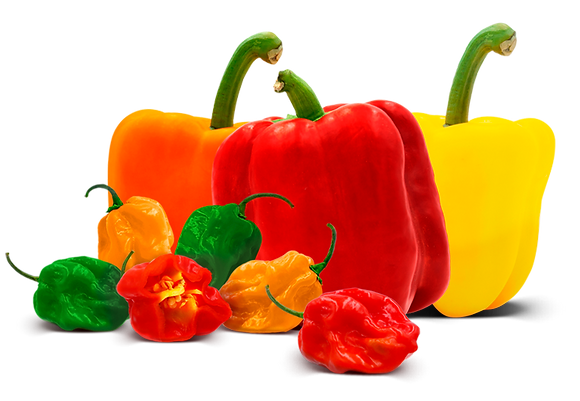
Mild or Hot
Each pepper has its unique set of properties and spicyness.
Big
or Small
Sweet Seasons Peppers come in all shapes and sizes.


WE KNOW
OUR SPICE
575,000 SHU

Habanero
Pepper
There is a wide variety of peppers that include chili peppers. However, sweet peppers are also part of the same family.

The heat of a pepper is measured using Scoville Heat Units (SHU). The scale ranges from 0 all the way to 3,000,000 units.
0 (zero) SHU
Bell
Pepper
Due to its wide range of spicyness, peppers have become an essential ingredient in different types of cuisine across the world not only for their flavor and texture but also for the color they can bring to a dish.
So many types
all of them fresh

Anaheim Peppers
A mild variety of chile pepper typically used in Mexican and Southwestern cooking.

Bell Peppers
Relatively large in size the bell pepper does not produce capsaicin.
That's why some people refer to them as sweet peppers. All bell peppers are green in origin, depending on the seed the peppers will turn red or orange or yellow when they ripe.

Caribe Peppers
Can be used to add a different color and flavor to salsas and other recipes.

Chilaca Peppers
Can be used fresh and diced in salsas or blended into hot sauce.

Habanero Peppers
Their aroma and flavor make them perfect for hot sauces.

Hungarian Peppers
The sweet, hot flavor of these peppers is very popular in mole sauces, and other traditional Latin dishes, soups and salads.

Jalapeño Peppers
Available in medium, smooth XXL, lightly striped large.

Red Jalapeño Peppers
A more mature version of the green jalapeño with a slightly stronger pungency.

Manzano Peppers
With a unique citrusy fruitiness, the flavor of the manzano can be described as a spicier bell pepper.

Poblano Peppers
It can be eaten raw or cooked but it is frequently roasted.

Serrano Peppers
Perfect for salsas, sauces, relishes, garnishes, making hot sauce and more.
Copyright © 2022 Sweet Seasons LLC. All rights reserved. Other logos, product and company names mentioned herein may be the trademarks of their respective owners.




.png)